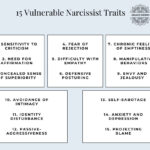How Does a Narcissist React When They Can’t Control You?
If you’ve found yourself in a toxic relationship with a narcissist you might be wondering ‘how does a narcissist react when they can’t control you?’ Narcissists are known for their manipulation tactics and love for control.
When they can’t exert this power, their actions may become confusing and disruptive. This blog post dives deep into these narcissist manipulation tactics, shedding light on their behaviors and how they react when they can’t control you.
If you’re interested in healing from narcissistic abuse, I warmly welcome you to my Narcissistic Abuse Recovery Program. It’s an easy self-paced online course which you can do at your own pace. My signature program combines scientific and spiritual tools for holistic healing of the body, mind, and spirit.
10 Narcissist Reactions When They Can’t Control You
Understanding how a narcissist acts when they can’t control you can empower you to recognize and respond effectively when faced with their controlling tactics.
Each tactic is followed by a brief description and an example to help you put things into perspective. Let’s delve into 10 common manipulative narcissist tactics:
1. They Will Try to Trigger You
Narcissists often seek to upset you intentionally to provoke an emotional response. They do this to reestablish their dominance and control.
For instance, they might bring up a sensitive topic from your past during an argument, aiming to derail the conversation and upset you. This way, they avoid accountability while leaving you feeling vulnerable and destabilized.
Related: 7 Signs of a Female Narcissist
2. Gaslighting
Narcissists employ gaslighting as a manipulation tactic especially when they sense they’re losing control. This narcissist control tactic helps them regain the upper hand by causing you to question your own perceptions and sanity.
As they erode your confidence in your own judgment, they create an environment of uncertainty and self-doubt. This disorientation makes it easier for them to manipulate you, maintain control, and evade accountability for their actions.
The goal is to shift the focus away from their behavior and onto your reaction, making you the ‘problem’ and them the ‘solution.’ It’s a devious narcissist manipulation technique aimed at preserving their self-image and maintaining the power dynamic in their favor.
Related: Is My Husband a Narcissist Quiz
3. Playing the Victim
When they feel their control slipping away, narcissists might play the victim card. They manipulate the narrative to portray themselves as the aggrieved party, shifting the blame onto you. This is one of the many weird things covert narcissists do.
For example, if you confront their unacceptable behavior, they might accuse you of causing their poor actions, diverting attention from their responsibility.
4. Silent Treatment
The silent treatment is a quintessential aspect of narcissistic controlling behavior. Narcissists use this tactic to create a power dynamic, subtly demonstrating they can ‘survive’ without you.
This manipulative approach involves ignoring you or withholding communication, affection, and sexual intimacy as a form of punishment. Whether it’s giving you the cold shoulder or stonewalling you after a disagreement, the objective remains the same—to instill guilt and promote self-doubt.
In doing so, they aim to coerce you into submission, reinforcing their control and underscoring your perceived dependency on their acknowledgment and validation.
Related: How to Make a Narcissist Fear You
5. Love Bombing
Love bombing is a common narcissistic manipulative tactic that starts in the beginning of the relationship. They shower you with affection, attention, and compliments to gain your trust and make you emotionally dependent on them. Once that they sense that you are hooked on them, they move into the devaluation stage. This is a part of the narcissistic abuse cycle.
When they feel that they’re losing their grip, they might revert to love bombing again, reigniting the cycle of excessive affection. This sudden overflow of kindness and adoration, contrasting their recent demeaning behavior, can leave you confused and more vulnerable to their control.
Don’t let them hypnotize you with their love bombing tricks, one of the classic 12 traits of a narcissist. It’s a calculated move to regain their dominance and keep you on an emotional rollercoaster, consistently destabilized and within their influence.
6. Triangulation
Triangulation is a tactic often witnessed when considering how a narcissist reacts when they can’t control you. It involves the strategic use of another person, or sometimes even an idea or situation, to validate the narcissist’s perspective and invalidate yours.
The narcissist may share your secrets with this third party or make negative comparisons between you two, all with the intention of creating insecurity and self-doubt in you.
This manipulation enables them to regain control, as you might feel compelled to strive harder to win their approval, not realizing that the game is rigged in their favor from the start.
Related: Narcissist Red Flags
7. Projecting
Projection, an integral characteristic on the narcissist checklist, is a maneuver narcissists commonly resort to, especially when they can’t control you. It involves them attributing their own negative qualities or actions onto you in an attempt to deflect blame.
For instance, if they’ve been dishonest, they may accuse you of lying. This tactic serves to divert attention, create confusion, and paint themselves in a more favorable light. When a narcissist feels their control is threatened, they may ramp up this behavior, throwing accusations at you with more frequency and intensity.
This is a desperate attempt to regain control by making you feel defensive and off-balance.
Related: 40 Signs A Narcissist Is Done With You
8. Intimidation
Intimidation is another common tactic on the list of ‘how does a narcissist react when they can’t control you’. Controlling narcissists may resort to intimidation, such as aggressive behavior or threats, to instill fear and maintain control.
This could manifest as yelling, destructive actions, or even subtle threats that make you uncomfortable and fearful.
Alternatively, they may use veiled threats or passive-aggressive remarks, all aimed at making you feel uncomfortable, fearful, and ultimately submissive. These tactics feed into their need to reassert dominance, reminding you of their power and your perceived vulnerability.
Related: Do Narcissists Feel Guilt?
9. Smear Campaigns
If they can’t control you, narcissists might resort to one of their more destructive tactics – launching a smear campaign. This involves spreading false or exaggerated stories about you to tarnish your reputation.
Their fabrications often paint you in a negative light and themselves as the victim or the ‘better’ person. They strategically disseminate these narratives among your friends, family, or coworkers, aiming to isolate you from your support network.
This isolating strategy seeks not only to leave you defenseless but also to make others less likely to believe you if you expose the narcissist’s manipulative behavior, effectively maintaining their false facade.
10. Hoovering
Hoovering provides a telling glimpse into how a narcissist reacts when they can’t control you. Named after the popular vacuum cleaner brand, this tactic involves the narcissist attempting to ‘suck’ you back into the relationship after a period of separation or a conflict.
They may employ a range of tactics, from charming flattery to heartfelt promises of change, or even playing on your sympathies to achieve this.
However, it’s crucial to remember that this is often a temporary facade. Once they feel their control has been reinstated, they tend to revert to their old manipulative behaviors, continuing the cycle of emotional abuse.
Related: Do Narcissists Know They Are Narcissists?
How does a narcissist react when they don’t care?
Understanding how a narcissist behaves when they seem to not care about you can be quite distressing. Remember, a narcissist’s primary concern is securing their narcissistic supply, which is a source of admiration, approval, or validation that fuels their ego.
Their seeming indifference doesn’t necessarily mean they don’t ‘care’—it’s rather an indication of their shifting focus to sustain this supply.
In such phases, they show their true colors. The mask they’ve worn to win your trust and admiration begins to slip off, revealing the behavioral cycle of a narcissist.
First, their ego feels threatened, which usually happens when they lose control. In response, they engage in various abusive behaviors to assert dominance. Then, they may play the victim to elicit sympathy and manipulate the narrative. Finally, they feel empowered, regaining control over you or the situation.
When they appear to not care, their reactions may range from indifference to outright neglect. They may start ignoring your feelings or needs, often prioritizing their own desires. Their communication may become shallow, disinterested, and self-centered.
You may notice them withdrawing affection, attention, and intimacy, leaving you feeling isolated. In extreme cases, they might abruptly end the relationship, often without providing an explanation or offering closure.
In such moments, it’s crucial to remember that this behavior reflects their inability to form and maintain healthy relationships, not a judgment of your worth.
It’s essential to take care of yourself, reach out for support, and consider professional help to navigate these challenging times. Always remind yourself: their actions are about them, not about you!
Why are narcissists so controlling?
Narcissists are often controlling because their inflated sense of self-importance and lack of empathy drives them to manipulate others to serve their needs and desires. They ensure their world aligns with their distorted view of reality where they are superior and entitled to others’ adoration and submission through control.
Narcissistic manipulative personality disorder drives narcissists to mask their deep-seated insecurities and fears. Their fear of being exposed as inadequate or being abandoned typically results in heightened manipulation tactics as they scramble to regain their dominance.
Additionally, control gives narcissists a sense of predictability and order, easing their underlying anxieties. They struggle to handle unpredictable situations or relationships they can’t dominate. Therefore, they exert control to avoid these perceived threats and maintain their falsely empowered state.
Ultimately, their controlling behavior is a manifestation of their personality disorder, and it is challenging to alter without professional intervention.
How to protect yourself from narcissistic manipulation tactics in relationships?

Navigating the distressing dynamics of a relationship with a narcissist can feel overwhelming. Here are five key strategies to safeguard your wellbeing, offering a beacon of hope in your journey towards recovery:
1. Educate Yourself:
Knowledge is power. Familiarize yourself with how a narcissist reacts when they can’t control you. Understanding their manipulative strategies can help you identify when you’re being targeted and counteract effectively.
2. Establish Boundaries:
Clear boundaries are crucial when learning how to deal with a narcissist. Decide what behavior you’ll tolerate and be firm. When they overstep, take action—whether that’s ending the conversation or limiting your interaction with them.
3. Practice Self-Care:
Regular self-care activities are essential for maintaining your mental health. This can include meditation, exercise, pursuing a hobby, or seeking narcissistic abuse therapy. Keeping your mind and body healthy can help you better cope with the stress of dealing with a narcissist.
4. Build a Support Network:
Surround yourself with friends, family, or support groups who understand what you’re going through. Their validation can help you feel less alone and more equipped to handle interactions with the narcissist. Remember, it’s okay to seek help and lean on others.
5. Seek Professional Help:
Engaging with a narcissist can be emotionally draining and confusing. Professional therapists, and coaches, especially those experienced in narcissistic abuse, can provide you with strategies to handle these situations and help in your recovery process.
If you’re dealing with such challenges, consider joining my Narcissistic Abuse Recovery Program or one to one counseling. I specialize in providing guidance and support to those struggling with narcissistic abuse.
Together, we can work through these experiences, equipping you with the tools you need to regain control and rebuild your life.
Recap on: how does a narcissist react when they can’t control you
Embarking on a healing journey from an emotionally manipulative narcissist often entails breaking free from their control. It’s a significant step, albeit one that might be fraught with anxiety and uncertainty due to the possibility of trauma bonding.
As you start breaking free from the narcissist manipulative tactics, you might find yourself asking ‘how does a narcissist react when they can’t control you?’
In this article, we’ve explored the 10 most common controlling tactics a narcissist might employ when they perceive a loss of control over you. Understanding their controlling behaviors equips you with the knowledge to identify and navigate these situations.
It’s important to remember that a narcissist’s behavior is a reflection of their personality disorder and insecurities rather than a commentary on your worth.
If you’re asking yourself ‘how does a narcissist react when they can’t control you’, it’s natural to feel scared or worried. Yet remember, your journey towards recovery is a courageous one, and it takes time and a great deal of self-love and self-compassion.
Be gentle with yourself, lean on your support network, and consider seeking professional help. Your resilience and determination to reclaim your life are commendable. Keep going, trust your instincts, and know that you’re not alone on this journey.
My Related Services:
–Narcissistic Abuse Recovery Program: Join a structured program that provides tools, resources, and guidance to help you navigate and heal from the impact of narcissistic abuse.
–Email Advice: Get guidance, insights, and support directly to your inbox.
FAQs
These are 10 common narcissist reactions when they can’t control you:
1. Gaslighting
2. Silent treatment
3. Love bombing
4. Triangulation
5. Projection
6. Intimidation
7. Launching a smear campaign
8. Hoovering.
9. Play victim
10. Intimidation
Yes, narcissists are typically manipulative. They use various tactics like gaslighting, triangulation, and projection to control others and meet their own needs.
Yes, narcissists tend to be controlling. They often seek to dominate relationships and situations to ensure they align with their needs and desires. This controlling behavior is a mechanism to mask their deep-seated insecurities and avoid feelings of vulnerability or inadequacy.
Narcissists manipulate using tactics like gaslighting (making you question your reality), love bombing (overwhelming you with affection), triangulation (using another person to validate their point of view), and projection (attributing their negative qualities onto you). They use these tactics to gain control and fuel their ego.
Additional Resources
Narcissist and Empath
Do Narcissists Cry?
Things Covert Narcissists Say
How Does a Narcissist React When You Stop Chasing Them?







